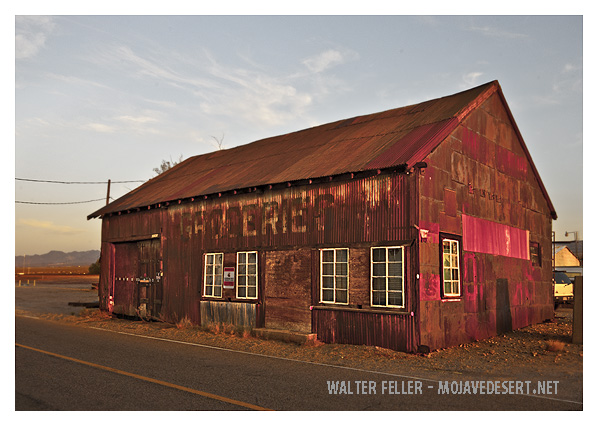Daggett Garage

The Befuddling Back Story Behind the Daggett Garage.
What is the Truth?
by Nicolas Webster
I'm sure most of those who have lived in the tiny town of Daggett, California, for a long period of time are familiar with the Daggett Garage. That rusty sheet metal-built building located close by to the Stone Hotel and the Daggett Market, between Santa Fe Street and the Union Pacific railroad tracks, owned by longtime Daggett resident Alan Golden. Most people know it was once Daggetts premier automobile garage, a livery, a grocery store and even a mess hall for soldiers during World War II who were assigned to protect the railroad and the bridges in the area.
The story of the Daggett Garage goes back further than that, though. According to most sources, the building started out as a repair facility for the Borate & Daggett Railroad in the 1880s, where the engine house (no, not roundhouse cause it never had a turntable) was located and housed the two Heisler locomotives that worked here, the Francis and the Marion. Later in in 1896, Daggett blacksmith Seymour Alf, with the help of a 20-mule team, hauled the building to the Waterloo Mill located at the foot of Daggett Mountain, whose ruins can still be seen on the mountain side from the road going between Daggett and Yermo.
The building served a similar purpose as an engine shed for the Calico Railroad, a 3-foot wide narrow gauge railroad employed to haul silver from the Waterloo and Silver King Mines at Calico to the mills at Daggett Mountain Two Porter locomotives, Uncle Dan (No. 1), a 0-4-0-, and Emil (No. 2), a 0-6-0, ran the line. (Most sources on the Calico Railroad engines call them Emil (No 1), and Sanger / Daniel (No. 2), but the original Porter specification sheets call them Uncle Dan and Emil).
According to Alan Golden, the engines would drive through the open doors on the north and south sides of the building. In 1901 the railroad hauled borax from Lead Mountain to Daggett for the American Borax Company.
After the Calico Railroad was abandoned and pulled up in 1907, the building remained here somewhere close to the present-day bridge crossing the Mojave River. In 1912 Walter Alf (Seymours son) moved the building once again, this time to its present location in Daggett.
Despite the well-known story of the Daggett Garage, and even the plaque in front of it erected by the seemingly Holy Order of E Clampus Vitus states this is the story itself, it may not be all the way true.
The Borate & Daggett Railroad was not built in the 1880s, but rather in 1897, to replace the famous Death Valley 20-Mule Teams hauling the borax from Borate to Daggett. The town of Marion sprung up in 1898 to house the workers who were employed to take care of the enormous mill that processed the borax from Borate before shipment to Daggett. If we take the dates of the Daggett Garage in the 1880s, its pretty much be left out in the middle of nowhere, now wouldnt it? However, the Calico Railroad was existent during the 1880s, having been completed in 1888 by the Oro Grande (later Waterloo) from the Waterloo Mine to the Mill. However, there are no pictures that could be found of the Daggett Garage at either location, neither at Marion nor at the Waterloo Mill, where it was supposedly located before movement to Daggett in 1912. There are no foundations at these sites to tell us where the building couldve been located.
Before blaming the people who built the plaque, to be fair, they did do their research but somewhere along the way, they might have muddled things up after having a party or a drink, or got something from a source that didnt have all the facts. Sadly, Seymour and Walter Alf are not with us anymore to tell us the truth and no records of the garages movements were kept in their familys archives. So to say that the Daggett Garage could have come from anywhere would be putting it mildly. The sad thing about stories that come from the desert is that they keep getting mixed up until we have something that is as far from the original truth as we know it.
Perhaps one day we may solve the mystery of the true story about the Daggett Garages origins, but until that day comes, heres a fair warning: Dont believe everything you hear until you have the facts.